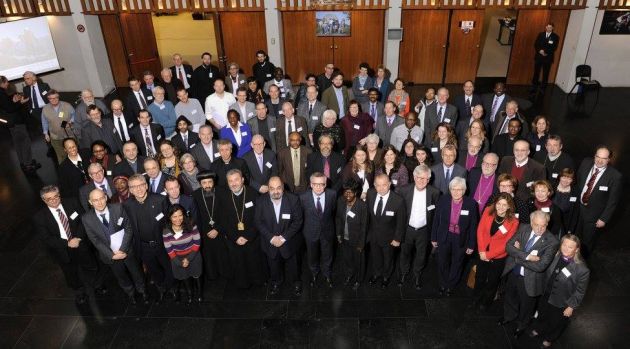Not just numbers, displaced people need to share their stories study finds

There are currently over 65 million people around the world who have been forced from their homes, according to the UN Refugee Agency, UNHCR, but all those who are displaced are not mere statistics.
They are people, something that can be missed by the mass media in reporting on them.
This observation was highlighted in a discussion at the World Council of Churches on Jan. 30 when representatives of church groups, the United Nations and a Christian media organization discussed media coverage of refugees at a presentation.
The discussion was titled: "Changing the narrative: Media, Migrants and Refugees" under the moderation of WCC director of communications, Marianne Ejdersten.
Participants discussed "Refugees Reporting", a research and advocacy project conducted in 2017 to support the communication rights of refugees seeking safe passage into and through Europe.
The project seeks to challenge public attitudes of intolerance and discrimination against them.
Peter Prove, director of the WCC Commission of the Churches on International Affairs, commended the "very important research project".
"This report gives us empirical evidence that can be used in reengaging in a more constructive manner the public discourse on refugees," he said.
"Migration has always been a feature of human society, but it is going to be even more of a feature in the future.
"We have no choice but to manage these population movements and make migration work for us all," said Prove, citing a recent report by UN secretary-general António Guterres.
WORLD ASSOCIATION FOR CHRISTIAN COMMUNICATION
The project coordinators are the WCC-backed World Association for Christian Communication - Europe Region (WACC Europe) and the ecumenical Churches' Commission for Migrants in Europe (CCME).
Sara Speicher, development manager for WACC and a WCC communication officer said, "We believe that the representation of refugees and migrants in the media plays a major role in the tone of the public debate and, ultimately, in the welcome and integration of refugees and migrants into their new countries."
She noted that in Europe, while the number of arrivals in 2017 have dropped from its peak of more than 1 million in 2015, the welcome and integration of refugees and migrants remains a highly divisive political, economic, and cultural topic.
Stephen Brown, President of WACC Europe said, "We want to spark debate and look at the global response to the research."
He outlined how, "WACC believes that everyone has the right to communicate and to be in communication, in the same way that they have the right to food, shelter, and security.
"In strategic alliances, we aim to be a catalyst for change for the common good, sharing information, knowledge, and experience in the field of communication. We call this 'communication rights'."
Nigerian Archbishop David Fabusoro of the Church of the Lord, Aladura (Prayer Fellowship) provided concrete examples of people on the move and noted that since Boko Haram attacks intensified in 2013, hundreds of thousands of people have been displaced across the region around the north-east of Nigeria.
NIGER DELTA CONFLICT
He also cited decades-old conflicts in the Niger Delta in the southwest and the emergence of Fulani herdsmen's forceful occupation of farmlands and properties that have "resulted in massive killings and displacement of people".
"Unfortunately, media representation is confusing and incomplete in all cases," said Fabusoro, noting "The insurgency of Boko Haram and the Niger Delta were reported as religious crises."
But he said the plight of displaced people many of whom move to Europe "are not reported and thereby made the people die in silence."
Leigh Foster, chief, Events, Campaigns and Goodwill Ambassadors, UNHCR said, "The WCC and LWF (Lutheran World Federation) have been amazing in mobilizing their membership," over refugees and migrants.
'SPEAKING FOR THEMSELVES'
She praised the discussion on the report as encouraging UNHCR's #WithRefugees campaign which aims to reinforce the message that refugees can speak for themselves.
Foster said it comes as there is "an increasingly toxic narrative, not only about refuges but anyone who is on the move."
Cornelia Kästner, senior communications officer for the Lutheran World Federation spoke of how her experience as a journalist encouraged her in covering refugees in her work to, "let the people talk".
She noted, "Refugees are not victims," but human beings and that in writing about them "how do we counter the numbing of society?"
"How do we prevent having the same story over and over again?" asked Kästner.
Only 21 percent of news items on asylum and migration reference a refugee or migrant: This points to a pattern of invisibility that creates a clear divide between the policies being discussed at the political level and the effects of those policies on people.
• Certain groups of people are even more invisible: Women and some other groups of people are disproportionately absent from news articles about refugees and migrants.
•Of the 21 percent of the news items that reference migrants or refugees, less than half (40%) of the articles quoted them directly: Direct quotes are the most accurate way to represent people, while inaccuracy of representation can easily lead to misunderstanding.
•Refugees and migrants are most often only identified by their "displacement": When media does not go beyond the refugee label, and when the public tacitly accepts refugee as an occupation, people are deprived of their humanity and dignity.
The project was made possible with financial support from the Otto per Mille (OPM) fund of the Waldensian Church in Italy. Additional financial support came from the Evangelical Church in the Rhineland, Germany, the World Council of Churches, and CCME, in collaboration with the Conference of European Churches and WACC Global.